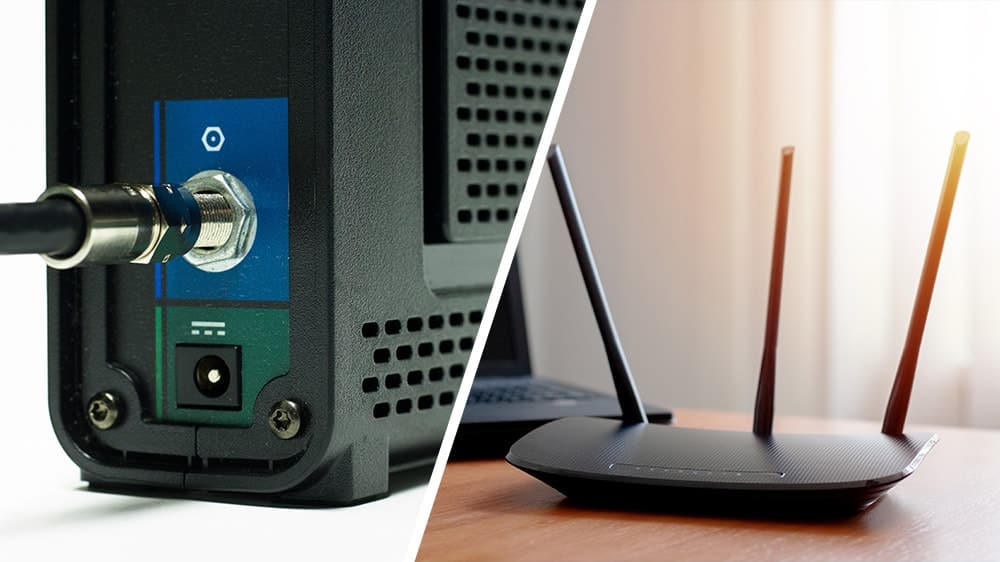
Understanding the equipment that powers your home internet can be a bit of a maze. Two of the most essential pieces are the modem and the router. While they might look similar sitting next to each other, both with multiple blinking lights, they serve distinct functions. Let’s unpack what each device does, how they differ, and whether you need both to stay connected.
What Is a Modem?
A modem is your direct link to the internet. It’s the device that communicates with your Internet Service Provider (ISP), like Mercury Broadband, to bring internet service into your home.
What Does a Modem Do?
- Signal Conversion: The modem converts the analog signals from your ISP into digital signals your devices can understand and vice versa.
- Connection Point: It connects your home to the wider internet through your ISP’s infrastructure, whether over telephone lines, coaxial cables or fiber optics.
- Public IP Address: The modem is assigned a public IP address, which identifies your network on the internet.
How Does a Modem Work?
The term “modem” stands for “modulator-demodulator.” It modulates outgoing digital signals from your network into analog signals suitable for transmission over your ISP’s infrastructure and demodulates incoming analog signals back into digital form for your devices.
What Is a Router?
A router connects multiple devices within your home to the internet and to each other, creating a network.
What Does a Router Do?
- Network Creation: Establishes a local area network (LAN) within your home, allowing devices to communicate with each other.
- Wireless Connectivity: Provides Wi-Fi access so devices can connect wirelessly.
- Traffic Management: Directs incoming and outgoing internet traffic efficiently to the correct devices.
- Security Features: Offers built-in firewalls and security protocols to protect your network.
How Does a Router Work?
Think of the router as a traffic director. It ensures data sent between devices and to the internet goes where it needs to go, using the most efficient routes. Routers assign local IP addresses to each device, managing their access to the internet and each other.
Modem vs. Router: Key Differences
While both devices are crucial for internet connectivity, they have different roles.
Modem
- Connects to ISP: Bridges your home network to the internet via your ISP.
- Signal Conversion: Translates signals between your ISP and your home network.
- One Connection: Typically connects to one device — the router.
Router
- Connects Devices: Links multiple devices to the modem and each other.
- Creates LAN: Establishes a local network within your home.
- Manages Traffic: Directs data efficiently and securely.
Do You Need Both a Modem and a Router?
In most cases, you need both to get internet access and distribute it to your devices.
Scenarios
- Using Only a Modem: You can connect a single device directly via Ethernet, but this limits you to one wired connection with no Wi-Fi or network between devices.
- Using Only a Router: Without a modem, the router can create a LAN for device communication but can’t access the internet.
Combined Devices
Some devices combine modem and router functions into one unit, known as a gateway or modem-router combo. While convenient, they may lack the advanced features of standalone routers.
How to Connect a Router to a Modem
Setting up your home network involves connecting your modem to your router.
Steps to Connect
- Power Off: Turn off both devices.
- Connect Modem: Plug the modem into your internet outlet (e.g., DSL, cable, or fiber line).
- Link Devices: Use an Ethernet cable to connect the modem’s output port to the router’s WAN (Internet) port.
- Power On: Turn on the modem first, wait for it to establish a connection, then power on the router.
- Configure Router: Access the router’s settings through a connected device to set up Wi-Fi networks and security.
Do You Need a Modem for Wi-Fi?
Yes, if you want to access the internet. The router provides Wi-Fi connectivity, but without a modem to connect to your ISP, you won’t have internet access.
Can You Use a Router Without a Modem?
- For Internet Access: No, you need a modem to connect to your ISP.
- For Local Networking: Yes, you can create a network for devices to communicate locally without internet access.
Understanding Modem-Router Combos
Advantages of Combo Units
- Convenience: Fewer devices to manage.
- Simplicity: Easier setup for basic networking needs.
Disadvantages
- Limited Features: May lack advanced settings and customization.
- Upgrade Limitations: Upgrading one function (modem or router) means replacing the entire unit.
The Role of Routers in Modern Networks
Routers have evolved significantly to handle the increasing demands of internet traffic.
Next-Generation Routers
As internet speeds increase and more devices connect to networks, routers must handle higher data throughput and complex tasks. Building next-generation routers involves overcoming challenges like memory speed constraints and packet arbitration bottlenecks. Emerging network processors play a crucial role in enhancing flexibility and reducing costs for new applications and protocols.
Advanced Features
- Network Processors: These processors offer the flexibility to implement functions like packet classification and route lookup, improving performance and adaptability to new technologies.
- Improved Performance: Advances in router architecture help manage high-speed interfaces and large switching capacities, which are essential for modern broadband demands.
By incorporating sophisticated algorithms and architectures, modern routers effectively handle the complexities of today’s internet traffic, ensuring smooth and efficient data flow.
Do You Need Both a Modem and a Router for Fiber Internet?
With fiber internet services, such as those offered by Mercury Broadband, the equipment setup might differ slightly.
Optical Network Terminal (ONT)
- Function: Acts like a modem for fiber connections, converting fiber optic signals into electrical signals.
- Placement: Installed by a technician, often outside or inside your home.
Router Still Required
Distribution: You still need a router to distribute the internet connection to your devices via Ethernet or Wi-Fi.
Enhance Your Online Experience with Mercury Broadband
- Understanding the difference between a modem and a router helps you set up and manage your home network effectively. While the modem connects your home to the internet, the router connects your devices to the modem and to each other, creating a network.
- At Mercury Broadband, we’re here to ensure you have the right equipment and support for a seamless internet experience, whether you’re using fixed wireless or fiber connections.
